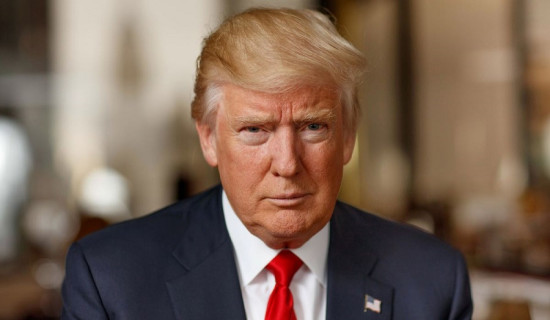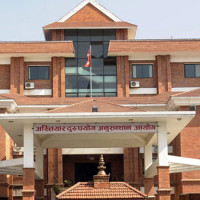- Tuesday, 29 April 2025
Govt will give business to House: PM
By Pallav Bhusal,Kathmandu,Feb.1: Prime Minister KP Sharma Oli has called for a renewed national effort towards economic development and political stability, urging lawmakers to prioritise legal reforms and constitutional amendments to pave the way for prosperity in the coming decade.
Addressing the first meeting of the winter session of the House of Representatives on Friday, the Prime Minister emphasised that Nepal stands at a critical juncture and cannot afford another decade of stagnation. “This should be a decade of prosperity. Let us not waste this time. Let us make the next decade a decade of development and give stability to the country,” he said, calling for cooperation across party lines.
Prime Minister Oli proposed targeted laws for major infrastructure projects, arguing that applying the same legal framework for both small and large-scale projects hampers efficiency. “We cannot push forward the development activities we want by having a single legal system for projects worth billions and others worth only a few million. For this, the government will make a law targeting specific projects,” he said.
He urged Parliament to move swiftly in endorsing these laws, bills and acts, assuring lawmakers that the government would do its part in ensuring implementation. “Rest assured, the government will give the House business, the House will make the law, and the government will work accordingly. If we fail, hold us accountable,”
he said.
Prime Minister Oli underscored the importance of collaboration among the three organs of government which are the executive, legislative and judiciary, stating that separation of powers should not lead to competition but rather a “cooperation of power” for national development.
“There are many places where the government can be held accountable if it crosses the line. But let’s also remember that every institution has its limits,” he said, subtly addressing concerns about judicial overreach and bureaucratic hurdles in governance.
With Nepal’s constitution now a decade old, Prime Minister Oli called for a comprehensive review. “We have been saying from the beginning that the constitution is a means for the benefit of the country and the people, not an end. And it is not unamendable,” he said.
To facilitate this, the government has formed an internal study task force, comprising experts and leaders from the Nepali Congress and CPN-UML. “We will first identify the issues that need amendment through discussions with various parties. A common understanding will be formed on agreed issues while the rest will be debated further,” he said.
On foreign policy, the Prime Minister reaffirmed Nepal’s commitment to maintaining strong ties with both neighbouring and friendly nations. He highlighted the success of his recent visit to China, where Nepal secured an additional Rs. 500 million in grants.
“We are constrained by our resources in terms of infrastructure and development. Be it BRI, MCC, World Bank, or AIIB, we don’t have the luxury to pick and choose. What matters is that these agreements serve the national interest and do not trap future generations in debt,” he said.
Taking a firm stand against the spread of misinformation, the Prime Minister denounced character assassinations through fake news and fabricated allegations. “A flood of
misleading information and rumours is attacking not just leaders but also individuals’ social character. There are even fake videos showing leaders hoarding immense wealth in foreign banks. This is unacceptable,” he said, regarding the social media bill registered by the government in the parliament secretariat.
He also said that the government menu did have no ‘party splitting’ plan.
He urged political parties to engage in healthy competition rather than resort to slander. “Criticism is necessary to hold the government accountable, but it should be constructive and based on facts, not lies designed to destroy reputations,” he said.
Prime Minister Oli expressed hope that lawmakers would prioritise meaningful debates over partisan conflicts. “I want this session to be weighty, not filled with false accusations, but with discussions on national interest, sovereignty, and good governance,” he said, welcoming all members to engage in constructive dialogue.
“I do not commit corruption, and I will not allow it to be done. If anyone has the courage, bring forth proof, any proof, in any place, at any time,” he concluded.
Similarly, addressing the fifth session of the Federal Parliament, Nepali Congress President and Parliamentary party leader Sher Bahadur Deuba reaffirmed the government’s commitment to strengthening Nepal’s democratic system, ensuring good governance, and accelerating economic progress.
Reflecting on Nepal’s political journey, Deuba paid tribute to the sacrifices made by martyrs and senior leaders. “Our democracy is built on the sacrifices of many, and we must honour their contributions by working towards a stronger, more prosperous nation,” he said.
Emphasising the importance of lawmaking, Deuba noted that several pending bills would be discussed in this session. “Democracy thrives on the rule of law, and Parliament must play its role in ensuring that the necessary legislation is enacted,” he said.
Deuba also addressed concerns regarding government stability, highlighting that the current administration was formed through a seven-point agreement between the Nepali Congress and the CPN-UML. “This coalition is committed to stability and delivering on its promises,” he said.
On economic challenges, Deuba acknowledged that Nepal is yet to achieve its desired level of progress. “We are politically empowered, but economic strength is equally crucial. The government is taking steps to improve the business environment and attract investment,” he said.
Calling for bipartisan cooperation in constitutional amendments, Deuba said “Any changes must uphold the core democratic values of federalism, pluralism, and inclusiveness.”
Deuba reiterated the importance of democracy and urged all parties to work together. “The alternative to democracy is more democracy,” he said.
Lawmaker Yogesh Bhattarai expressed their views on behalf of the UML urging the lawmakers to make the winter session more effective.
Likewise, CPN (Maoist Center) Chief Whip Hitraj Pandey opposed the government's introduction of an ordinance without withdrawing a bill under parliamentary review. Speaking in the Parliament on Friday, he criticised the move as bypassing due process. He also questioned the government's commitment to anti-corruption efforts, urging concrete action instead of mere statements.
Vice President Dr. Swarnim Wagle of Rastriya Swatantra Party expressed that the resumption of Parliament feels like opening doors but telling people to stop. He criticised the government for delaying parliamentary sessions, calling it a lock on people's homes. Wagle also accused the government of political revenge against their party president Rabi Lamichhane and demanded investigations into ongoing scandals and legal proceedings.
Rastriya Prajatantra Party Chairman Rajendra Lingden accused people close to the government of engaging in corruption, claiming the PM was unaware. He also criticised the government's use of ordinances, suggesting better solutions could be reached through discussions with opposition parties. Lingden questioned the fairness of judicial treatment, citing the detention of Rabi Lamichhane compared to ruling party leaders.
At the beginning of the session on Friday, the RSP lawmakers protested by standing demanding that they should be first allowed to deliver their views which Speaker Ghimire rejected and entered the business by reading out the letters received from the Office of the President. Thereafter, the RSP lawmakers left the House stating that they would boycott the meeting for 15 minutes. They entered the House again when PM Oli was addressing the House.
All the six ordinances issued earlier were also tabled in the House of Representatives today.
On behalf of Prime Minister KP Sharma Oli, Minister for Communications and Information Technology, Prithvi Subba Gurung, tabled the 'Ordinance designed to amend some Nepal Acts on Promotion of Good Governance and Public Service Delivery, 2081' during the meeting of the House of Representatives.
Similarly, Deputy Prime Minister and Finance Minister Bishnu Prasad Paudel tabled the 'Ordinance on Economic Work Procedure and Fiscal Accountability (1st amendment), 2081'; 'Privatisation (1st amendment), 2081'; and 'Ordinance designed to amend some laws on Reform in Economic and Commercial Atmosphere and Investment Promotion, 2081'.
Similarly, Minister for Land Reform, Cooperatives and Poverty Alleviation, Balram Adhiarki, presented the 'Ordinance designed to amend some Nepal Acts relating to Cooperatives, 2081'; and 'Ordinance designed to amend some Nepal Acts relating to Land, 2081.'
The next meeting of the House of Representatives is scheduled for February 6.

















